
Heraclitus was an ancient Greek pre-Socratic philosopher from the city of Ephesus, which was then part of the Persian Empire. He exerts a wide influence on ancient and modern Western philosophy, through the works of such authors as Plato, Aristotle, Hegel, and Heidegger.
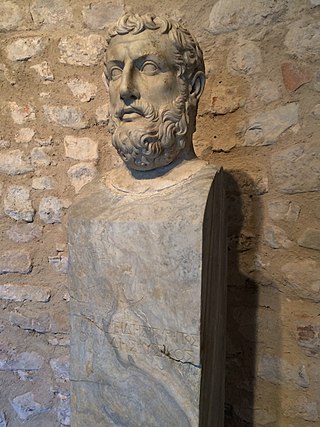
Parmenides of Elea was a pre-Socratic Greek philosopher from Elea in Magna Graecia.
Pre-Socratic philosophy, also known as Early Greek Philosophy, is ancient Greek philosophy before Socrates. Pre-Socratic philosophers were mostly interested in cosmology, the beginning and the substance of the universe, but the inquiries of these early philosophers spanned the workings of the natural world as well as human society, ethics, and religion. They sought explanations based on natural law rather than the actions of gods. Their work and writing has been almost entirely lost. Knowledge of their views comes from testimonia, i.e. later authors' discussions of the work of pre-Socratics. Philosophy found fertile ground in the ancient Greek world because of the close ties with neighboring civilizations and the rise of autonomous civil entities, poleis.
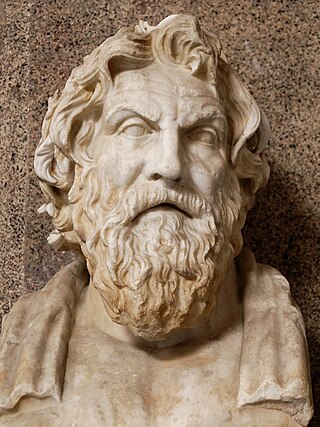
Antisthenes was a Greek philosopher and a pupil of Socrates. Antisthenes first learned rhetoric under Gorgias before becoming an ardent disciple of Socrates. He adopted and developed the ethical side of Socrates' teachings, advocating an ascetic life lived in accordance with virtue. Later writers regarded him as the founder of Cynic philosophy.
Ancient Greek philosophy arose in the 6th century BC. Philosophy was used to make sense of the world using reason. It dealt with a wide variety of subjects, including astronomy, epistemology, mathematics, political philosophy, ethics, metaphysics, ontology, logic, biology, rhetoric and aesthetics. Greek philosophy continued throughout the Hellenistic period and later evolved into Roman philosophy.
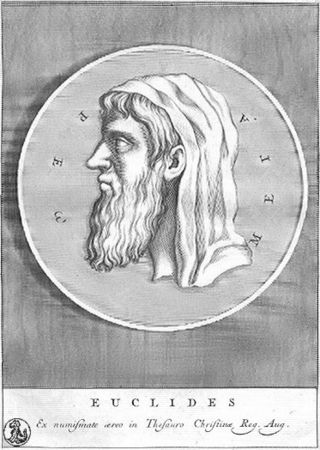
Euclid of Megara was a Greek Socratic philosopher who founded the Megarian school of philosophy. He was a pupil of Socrates in the late 5th century BC, and was present at his death. He held the supreme good to be one, eternal and unchangeable, and denied the existence of anything contrary to the good. Editors and translators in the Middle Ages often confused him with Euclid of Alexandria when discussing the latter's Elements.

Socratic dialogue is a genre of literary prose developed in Greece at the turn of the fourth century BC. The earliest ones are preserved in the works of Plato and Xenophon and all involve Socrates as the protagonist. These dialogues, and subsequent ones in the genre, present a discussion of moral and philosophical problems between two or more individuals illustrating the application of the Socratic method. The dialogues may be either dramatic or narrative. While Socrates is often the main participant, his presence in the dialogue is not essential to the genre.

Metrodorus of Lampsacus was a Greek philosopher of the Epicurean school. Although one of the four major proponents of Epicureanism, only fragments of his works remain. A Metrodorus bust was found in Velia, slightly different modeled to depict Parmenides.
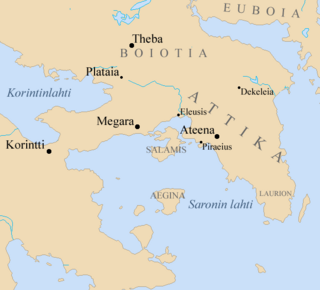
The Megarian school of philosophy, which flourished in the 4th century BC, was founded by Euclides of Megara, one of the pupils of Socrates. Its ethical teachings were derived from Socrates, recognizing a single good, which was apparently combined with the Eleatic doctrine of Unity. Some of Euclides' successors developed logic to such an extent that they became a separate school, known as the Dialectical school. Their work on modal logic, logical conditionals, and propositional logic played an important role in the development of logic in antiquity.
Doxography is a term used especially for the works of classical historians, describing the points of view of past philosophers and scientists. The term was coined by the German classical scholar Hermann Alexander Diels.
Simon the Shoemaker was an associate of Socrates, and a 'working-philosopher'. He is known mostly from the account given in Diogenes Laërtius' Lives and Opinions of Eminent Philosophers. He is also mentioned in passing by Plutarch and Synesius; a pupil of Socrates, Phaedo of Elis, is known to have written a dialogue called Simon.

Aeschines of Sphettus or Aeschines Socraticus, son of Lysanias, of the deme Sphettus of Athens, was a philosopher who in his youth was a follower of Socrates. Historians call him Aeschines Socraticus—"the Socratic Aeschines"—to distinguish him from the more historically influential Athenian orator also named Aeschines. His name is sometimes but now rarely written as Aischines or Æschines.
Hellenistic philosophy is Ancient Greek philosophy corresponding to the Hellenistic period in Ancient Greece, from the death of Alexander the Great in 323 BC to the Battle of Actium in 31 BC. The dominant schools of this period were the Stoics, the Epicureans and the Skeptics.
David Neil Sedley FBA is a British philosopher and historian of philosophy. He was the seventh Laurence Professor of Ancient Philosophy at Cambridge University.

Cynicism is a school of thought in ancient Greek philosophy, originating in the Classical period and extending into the Hellenistic and Roman Imperial periods. According to Cynicism, people are reasoning animals, and the purpose of life and the way to gain happiness is to achieve virtue, in agreement with nature, following one's natural sense of reason by living simply and shamelessly free from social constraints. The Cynics rejected all conventional desires for wealth, power, glory, social recognition, conformity, and worldly possessions and even flouted such conventions openly and derisively in public.
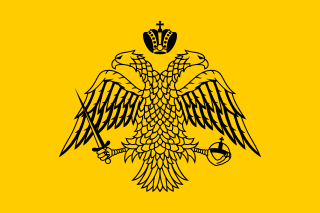
The Asia Minor Greeks, also known as Asiatic Greeks or Anatolian Greeks, make up the ethnic Greek populations who lived in Asia Minor from the 13th century BC as a result of Greek colonization, up until the forceful population exchange between Greece and Turkey in 1923, though some communities in Asia Minor survive to the present day.

The Italian school of pre-Socratic philosophy refers to Ancient Greek philosophers in Italy or Magna Graecia in the 6th and 5th century BC. Contemporary scholarship disputes the Italian school as a historical school rather than simply a geographical one.
This page lists topics related to ancient Greece.